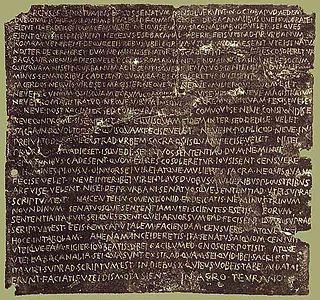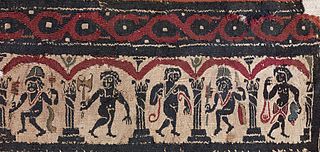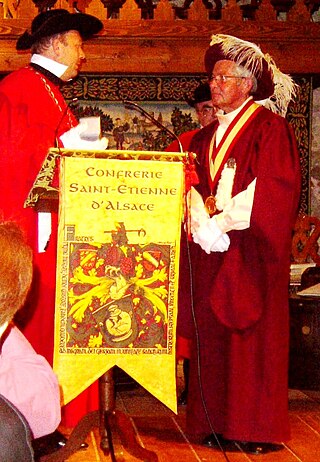Related Research Articles

Gaius Julius Caesar Augustus, also known as Octavian, was the founder of the Roman Empire. He reigned as the first Roman emperor from 27 BC until his death in AD 14. The reign of Augustus initiated an imperial cult, as well as an era associated with imperial peace in which the Roman world was largely free of armed conflict. The Principate system of government was established during his reign and lasted until the Crisis of the Third Century.
This article concerns the period 189 BC – 180 BC.

The Bacchanalia were unofficial, privately funded popular Roman festivals of Bacchus, based on various ecstatic elements of the Greek Dionysia. They were almost certainly associated with Rome's native cult of Liber, and probably arrived in Rome itself around 200 BC. Like all mystery religions of the ancient world, very little is known of their rites. They seem to have been popular and well-organised throughout the central and southern Italian peninsula.
Year 160 BC was a year of the pre-Julian Roman calendar. At the time it was known as the Year of the Consulship of Gallus and Cethegus and the Fourth Year of Houyuan. The denomination 160 BC for this year has been used since the early medieval period, when the Anno Domini calendar era became the prevalent method in Europe for naming years.

A religious festival is a time of special importance marked by adherents to that religion. Religious festivals are commonly celebrated on recurring cycles in a calendar year or lunar calendar. The science of religious rites and festivals is known as heortology.

In ancient Roman religion and mythology, Liber, also known as Liber Pater, was a god of viticulture and wine, male fertility and freedom. He was a patron deity of Rome's plebeians and was part of their Aventine Triad. His festival of Liberalia became associated with free speech and the rights attached to coming of age. His cult and functions were increasingly associated with Romanised forms of the Greek Dionysus/Bacchus, whose mythology he came to share.

The senatus consultum de Bacchanalibus is a notable Old Latin inscription dating to 186 BC. It was discovered in 1640 at Tiriolo, in Calabria, southern Italy. Published by the presiding praetor, it conveys the substance of a decree of the Roman Senate prohibiting the Bacchanalia throughout all Italy, except in certain special cases which must be approved specifically by the Senate.
A calendar era is the period of time elapsed since one epoch of a calendar and, if it exists, before the next one. For example, it is the year 2024 as per the Gregorian calendar, which numbers its years in the Western Christian era.
Paculla Annia was a Campanian priestess of Bacchus. She is known only through the Roman historian Livy's account of the introduction, growth and spread of unofficial Bacchanalia festivals, which were ferociously suppressed in 186 BC under threat of extreme penalty.

Tiriolo is a town and comune in the province of Catanzaro in the Calabria region of southern Italy. It was the birthplace of Renaissance painter Marco Cardisco.

The cult of Dionysus was strongly associated with satyrs, centaurs, and sileni, and its characteristic symbols were the bull, the serpent, tigers/leopards, ivy, and wine. The Dionysia and Lenaia festivals in Athens were dedicated to Dionysus, as well as the phallic processions. Initiates worshipped him in the Dionysian Mysteries, which were comparable to and linked with the Orphic Mysteries, and may have influenced Gnosticism. Orpheus was said to have invented the Mysteries of Dionysus. It is possible that water divination was an important aspect of worship within the cult.

In ancient Greek religion, an orgion was an ecstatic form of worship characteristic of some mystery cults. The orgion is in particular a cult ceremony of Dionysos, celebrated widely in Arcadia, featuring "unrestrained" masked dances by torchlight and animal sacrifice by means of random slashing that evoked the god's own rending and suffering at the hands of the Titans. The orgia that explained the role of the Titans in Dionysos's dismemberment were said to have been composed by Onomacritus. Greek art and literature, as well as some patristic texts, indicate that the orgia involved snake handling.
Quintus Marcius Philippus, also Quintus Marcius L. f. Q. n. Philippus, was a Roman consul in 186 BC and again in 169 BC.
The Zhangjiashan Han bamboo texts are ancient Han dynasty Chinese written works dated 196–186 BC. They were discovered in 1983 by archaeologists excavating tomb no. 247 at Mount Zhangjia (張家山) of Jiangling County, Hubei Province. The tomb was built for an early Western Han era official who had died in 186 BC. The texts were written on traditional bamboo slips connected by cords into rolled scrolls. The written works included legal case precedents, literature on medicine including Book on Vessels, mathematics, military strategy, and a calendar with dates ranging from 202 BC to 186 BC.
Quintus Minucius Rufus was a Roman senator and military commander.
The gens Atinia was a minor plebeian family at Ancient Rome, which came to prominence during the late Republic. No members of this gens ever attained the consulship, although several were praetors in the early second century BC, beginning with Gaius Atinius Labeo 195.

A senatus consultum is a text emanating from the senate in Ancient Rome. It is used in the modern phrase senatus consultum ultimum.
The gens Duronia was a plebeian family at ancient Rome. Although relatively obscure, the family was of sufficient importance to hold a seat in the Roman Senate. Its members are mentioned during the first and second centuries BC.

A Bacchanalian fraternity is a fraternal society of professional or amateur aficionados of wine and perhaps other alcoholic beverages, typically promoting the wines of represented regions, such as wines from France and Germany. The term derives from Bacchus, the Roman equivalent of Dionysus, god of wine and intoxication.
The gens Opiternia was a Faliscan family occurring in Roman history. The nomen Opiternius is a patronymic surname, derived from the ancient praenomen Opiter, as is the related Opetreius, and perhaps shares a common root with the nomina of the gentes Oppia and Opsia.